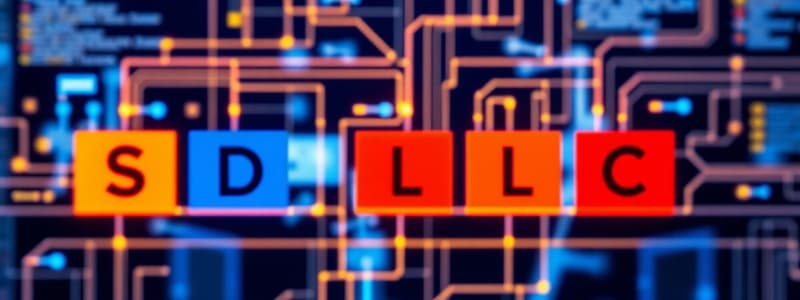Podcast
Questions and Answers
What is the primary goal of the planning phase in the Systems Development Life Cycle?
What is the primary goal of the planning phase in the Systems Development Life Cycle?
- To analyze existing systems for improvement opportunities
- To gather requirements for the new system
- To understand why the information system should be built (correct)
- To design the user interface and experience
During which phase of the SDLC is the analysis strategy developed?
During which phase of the SDLC is the analysis strategy developed?
- Implementation
- Analysis (correct)
- Planning
- Design
What is the final deliverable of the analysis phase presented to the project sponsor?
What is the final deliverable of the analysis phase presented to the project sponsor?
- Development cost estimation
- Work plan
- System proposal (correct)
- User interface design
Which of the following is NOT a step in the planning phase of the SDLC?
Which of the following is NOT a step in the planning phase of the SDLC?
What is the primary responsibility of a systems analyst within the SDLC?
What is the primary responsibility of a systems analyst within the SDLC?
What does the design phase primarily determine?
What does the design phase primarily determine?
Which of the following skills is NOT specifically mentioned as necessary for systems analysts?
Which of the following skills is NOT specifically mentioned as necessary for systems analysts?
What role does a project manager play in the development of an information system?
What role does a project manager play in the development of an information system?
Which step is involved in the design phase of the SDLC?
Which step is involved in the design phase of the SDLC?
What aspect does the analysis phase specifically focus on?
What aspect does the analysis phase specifically focus on?
In the context of systems analysis, what is primarily focused on by a business analyst?
In the context of systems analysis, what is primarily focused on by a business analyst?
Which phase follows the planning phase in the Systems Development Life Cycle?
Which phase follows the planning phase in the Systems Development Life Cycle?
Why is ethical behavior important for systems analysts?
Why is ethical behavior important for systems analysts?
Which of the following best describes the role of a change management analyst?
Which of the following best describes the role of a change management analyst?
Which part of the Systems Development Life Cycle involves determining how the IS can support business needs?
Which part of the Systems Development Life Cycle involves determining how the IS can support business needs?
What is a significant task that systems analysts perform related to organizational improvements?
What is a significant task that systems analysts perform related to organizational improvements?
What is the first step in the implementation phase?
What is the first step in the implementation phase?
Which of the following is NOT part of the implementation phase?
Which of the following is NOT part of the implementation phase?
What does Business Process Management (BPM) primarily focus on?
What does Business Process Management (BPM) primarily focus on?
What is the main purpose of creating a Support Plan during implementation?
What is the main purpose of creating a Support Plan during implementation?
What aspect does Business Process Reengineering (BPR) focus on?
What aspect does Business Process Reengineering (BPR) focus on?
What is the main goal of Business Process Automation (BPA)?
What is the main goal of Business Process Automation (BPA)?
What is a defining factor for when a project is identified within an organization?
What is a defining factor for when a project is identified within an organization?
Which step in the implementation phase involves turning off the old system?
Which step in the implementation phase involves turning off the old system?
What does technical feasibility primarily assess?
What does technical feasibility primarily assess?
Which question does economic feasibility address?
Which question does economic feasibility address?
What is typically included in a feasibility study deliverable?
What is typically included in a feasibility study deliverable?
Which method is used to assess whether a project will break even financially?
Which method is used to assess whether a project will break even financially?
What does the Return on Investment (ROI) formula calculate?
What does the Return on Investment (ROI) formula calculate?
What is one key aspect of technical feasibility that should be evaluated?
What is one key aspect of technical feasibility that should be evaluated?
In the context of cash flow analysis, what do inflows represent?
In the context of cash flow analysis, what do inflows represent?
What is the first step in conducting an economic feasibility analysis?
What is the first step in conducting an economic feasibility analysis?
What is the primary role of a project sponsor in the System Development Life Cycle (SDLC)?
What is the primary role of a project sponsor in the System Development Life Cycle (SDLC)?
Which of the following best describes tangible value in the context of a project sponsor's insights?
Which of the following best describes tangible value in the context of a project sponsor's insights?
Who typically completes the system request document?
Who typically completes the system request document?
What is assessed during the feasibility analysis of a project?
What is assessed during the feasibility analysis of a project?
In a system request document, what do 'special issues' refer to?
In a system request document, what do 'special issues' refer to?
Why must the completed system request be submitted to an approval committee?
Why must the completed system request be submitted to an approval committee?
Which of the following elements is considered a business requirement in a project?
Which of the following elements is considered a business requirement in a project?
What is the significance of a project sponsor's insights into business value?
What is the significance of a project sponsor's insights into business value?
Flashcards are hidden until you start studying
Study Notes
Systems Analysis and Design
- The Systems Development Life Cycle (SDLC) is a process for determining how an IS supports business needs, designing, building, and delivering it to users.
- The systems analyst is the key person in the SDLC, responsible for analyzing the business situation, identifying improvement opportunities, and designing the IS.
- Systems analysts must have technical, business, analytical, interpersonal, management, and ethical skills.
Systems Analyst Roles
- Business analysts focus on IS issues surrounding the system.
- Systems analysts focus on the business issues surrounding the system.
- Infrastructure analysts focus on technical issues.
- Change management analysts focus on the people and management issues surrounding system installation.
- Project managers ensure that the project is completed on time and within budget, and that the system delivers the expected value to the organization.
The Systems Development Life Cycle (SDLC)
- The SDLC is composed of four phases: Planning, Analysis, Design, and Implementation.
- Each phase includes steps that rely on techniques to produce deliverables, which are specific documents that explain elements of the system.
Planning
- The planning phase determines why an IS should be built and how the project team will build it.
- Project initiation identifies the system’s business value.
- Project Management involves creating a work plan, staffing the project, and using techniques to control and manage the project throughout the SDLC.
Analysis
- The analysis phase addresses who will use the system, what it will do, where and when it will be used.
- The project team investigates current systems, identifies improvement opportunities, and develops a concept for the new system.
- The analysis phase consists of three steps: analysis strategy, requirements gathering, and system proposal.
Design
- The design phase determines how the system will operate, including hardware, software, network infrastructure, user interface, forms, reports, programs, databases, and files.
- The design phase includes four steps: design strategy, architecture design, database and file specifications, and program design.
Implementation
- During implementation, the system is developed or purchased and installed.
- This phase is often the longest and most expensive part of the process.
- The implementation phase consists of three steps: system construction, installation, and support plan.
Project Identification and Initiation
- A project is identified when someone in the organization recognizes a business need for a system.
- New IS projects may emerge from Business Process Management (BPM).
Business Process Management (BPM)
- BPM is a methodology for continuous improvement of end-to-end business processes.
- BPM involves defining and mapping process steps, creating ways to improve value-adding steps, eliminating or consolidating non-value-adding steps, and adjusting electronic workflows to match improved processes.
- Business Process Automation (BPA) uses technology to complement or substitute manual processes.
- Business Process Improvement (BPI) creates new or redesigned processes to improve workflows, and/or utilizes new technologies for process restructuring.
- Business Process Reengineering (BPR) fundamentally changes how an organization operates.
Project Sponsor
- The project sponsor has a vested interest in the system’s success and works throughout the SDLC to ensure the project’s proper direction.
- The project sponsor is the primary point of contact for the project team.
- The size or scope of the project determines the kind of sponsor involved.
- The project sponsor provides insights for determining the business value expected from the system.
System Request
- The system request is a document that describes the business reasons for building a system and its expected value.
- The project sponsor completes this form as part of a formal system selection process.
- The business requirements define the system’s necessary capabilities.
- The business value describes the organization’s expected benefits from the system.
- The document includes a catchall category for special issue considerations.
- The completed system request is submitted to the approval committee for consideration.
Feasibility Analysis
- Feasibility analysis helps the organization decide whether to proceed with a project.
- It identifies project risks that need management if the project is approved.
- Most feasibility analyses include techniques to assess technical, economic, and organizational feasibility.
Technical Feasibility
- Technical feasibility assesses the extent to which the system can be successfully designed, developed, and installed by the IT group.
- It is a technical risk analysis that determines if the system can be built.
- Risks to successful project completion should be considered.
Economic Feasibility
- Economic feasibility, also called a cost-benefit analysis, identifies the costs and benefits associated with a system.
- It addresses whether to build the system.
- Cash flow, both inflows and outflows, are estimated over some future period.
- Common methods for evaluating project worth include Return on Investment (ROI) and Break-Even Point (BEP).
Discounted Cash Flow Technique
- This technique compares the present value of cash inflows and outflows for the project in today's dollar terms.
- Net present value (NPV): the difference between the total present value of benefits and the total present value of costs.
- Steps to conduct an economic feasibility analysis include identifying costs and benefits, assigning values, determining the cash flow, and calculating profitability.
Studying That Suits You
Use AI to generate personalized quizzes and flashcards to suit your learning preferences.



